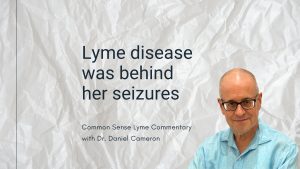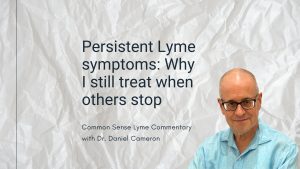Call for your appointment today 914-666-4665 | Mt. Kisco, New York

Clinicians face great challenges in diagnosing disorders that involve symptoms seen in both general medicine and psychiatry, ” wrote Robert Bransfield, MD, a psychiatrist and professor at Rutgers Robert Wood Johnson Medical School. All too often, these patients are labeled as having “excessive” symptoms and given outdated diagnoses (i.e. psychosomatic disorder). Symptoms of Lyme disease are not “excessive” wrote Bransfield, MD.
“There is often difficulty differentiating between psychosomatic, somatopsychic, multisystem illness, and different degrees of medical uncertainty,” wrote Bransfield.
The term “excessive” is used in the diagnosis of somatic symptom disorder and is, in fact, listed in the DSM-5 criterion. “Excessive thoughts, feelings, or behavior related to somatic symptoms, which have been present for at least six months is a criterion for somatic symptom disorder in DSM-5,” Bransfield points out.
Some individuals with Lyme disease could be misdiagnosed with this disorder. Testing is often negative, symptoms may wax and wane, and psychiatric manifestations may accompany physical pains, causing both mental and bodily distress for the patient.
But as Bransfield points out, “A psychiatric diagnosis cannot be given solely based upon the absence of physical, laboratory, or pathological findings.”
In fact, “Many ‘all in your head’ conditions may be related to the microbiome and the immune system,” he argues.
For instance, Lyme disease is caused by a bacterial infection. “Some patients with Lyme disease are viewed as having an excessive concern for their symptoms,” writes Bransfield. Actually, the Infectious Diseases Society of America’s (IDSA) Lyme disease guidelines “dismissed the chronic complaints from Lyme disease as being the ‘aches and pains of daily living.’”
Meanwhile, patients with complex, poorly understood illnesses, such as Lyme disease, chronic fatigue syndrome, fibromyalgia, irritable bowel syndrome, and chronic pain syndrome may be diagnosed with bodily distress disorder or bodily distress syndrome. These diagnoses, writes Bransfield, have not been scientifically validated.
“In the definition of bodily distress syndrome, there is a group of conditions that have little in common other than being distressing to deal with by some physicians,” he writes.
According to Bransfield, bodily distress disorder involves “bodily symptoms that the individual finds distressing and to which excessive attention is directed … and is not alleviated by appropriate clinical examination or investigations and appropriate reassurance.”
[bctt tweet=”Patients with complex, multisystem illnesses that are poorly understood, such as Lyme disease, are often labeled as having a psychosomatic or psychiatric disorder. ” username=”DrDanielCameron”]
Bodily distress disorder symptoms are persistent, last at least several months and involve multiple bodily symptoms that may vary over time, he explains. Sometimes, there is only one symptom, usually pain or fatigue.
“If a previously healthy and active person acquires a debilitating, multisystem condition, with multiple complaints including paralyzing fatigue and pain that adversely impact multiple areas of functioning,” writes Bransfield, “and the evaluating physician has an inadequate knowledge of the illness, takes an inadequate history, performs an inadequate exam, and does not understand the seriousness of symptoms, or fails to use adequate clinical judgment, how can the patient’s response to the physician’s “reassurance” be considered excessive?”
Related Articles:
Complex multisystemic illnesses lead to psychiatric diagnosis
Dismissing chronic Lyme disease for somatic symptom disorder
References:
- Bransfield RC, Friedman KJ, Differentiating Psychosomatic, Somatopsychic, Multisystem Illnesses and Medical Uncertainty. Healthcare 2019, 7(4), 114.




I had the Lyme disease Gone thru a lot of illnesses, then they move on with no reasons Now I have been diagnosed neuropathy reason unknown What next
I have Lyme disease patients with neuropathy in my practice. I also refer them to a neurologist to look for other causes.
Thank you for posting this article. It is an important subject that hits home.
I had an embedded tick bite in 2013. I was not diagnosed with Lyme at the time because I had no rash or symptoms right after the tick bite. I was an avid hiker and mountain climber as well as a classical guitarist before I became ill. Unfortunately, I went through the denial of my illness by some doctors, family and friends. In response, I felt guilty about being sick. Sometimes I would spend months denying my illness and remaining sick. I’d get nervous telling people about it, anticipating they would be negative toward me. I tried to imagine the illness would just go away. Instead, my neurological symptoms got worse.
When someone has Lyme Disease, they are legitimately ill. Formerly active, happy people do not suddenly turn into “hypochondriacs.” Lyme Disease is misunderstood by too many people. Thanks for clarifying this.